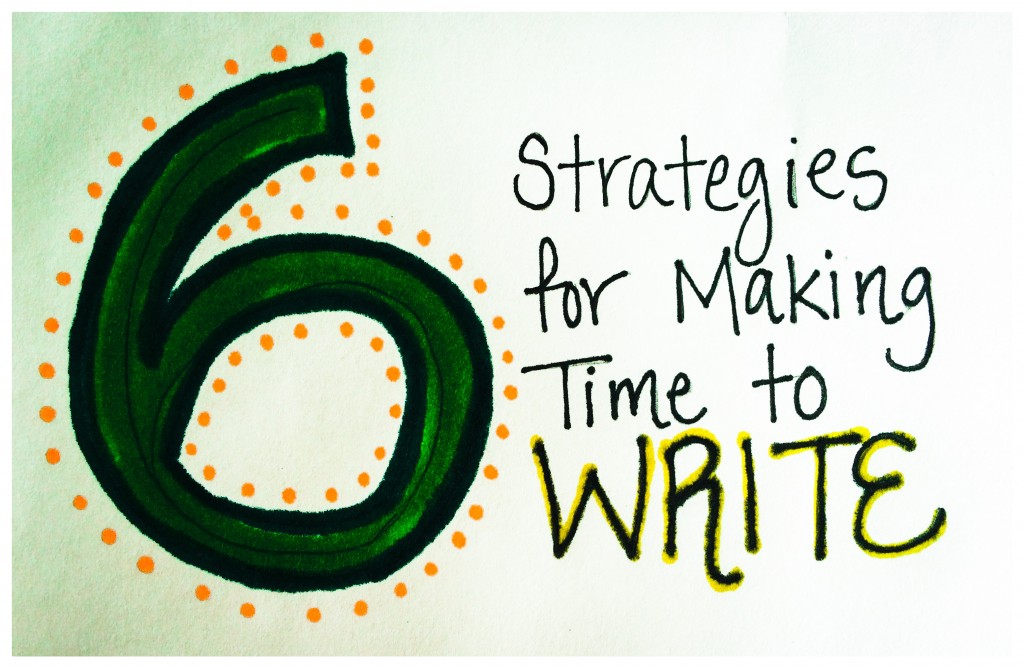I have so much free time, I don’t know what to do with it all. I finish my client projects early and have no trouble devoting hours to my own writing. In fact, I wish I had more to do!
Just kidding.
Unfortunately, time is not something many of us have a lot of. If you’re like me, you’re probably treading water, trying to keep from drowning in your to-do list. “Work on my novel” or “Write a blog post” might make it onto your list, but how often do you get to check off that box?
We are all busy. Some of us are busier than others, and some of us could prioritize better. My life goes in waves, and I bet yours does, too.
So, how do you find time to write? Well, you don’t. You make time to write.
Now, an aside: There are periods in life when something or someone needs your full attention—a sick child, an ailing parent, a catastrophic injury, a financial crisis. During those stretches, don’t feel bad if you aren’t able to make writing a priority, because you legitimately can’t.
For most of us, though, we can make daily choices to be more productive, achieve our goals, and maybe even finish writing a book. Here are some strategies to help you make more time to write.
#1 Get a routine
I talk a lot about forming a writing routine. That’s because most people are more likely to be successful as a writer if they set a writing routine and stick to it. This might sound easier said than done, but trust me: Once it’s set, everything gets easier. Your brain transitions quicker into “writing mode,” you prioritize better, and you end up being more productive because you have a set period of time to get writing done.
Children’s author A.J. Irving has a routine that works well for her:
#2 Unplug the TV
The average person watches three hours of television a night. That’s 21 hours a week! Imagine how much you could get done if you weren’t hooked on Downton Abbey or Parks and Recreation.
I love how author and book coach Jane Freund describes it:
#3 Slog it out
The truth is, pursuing your passion isn’t easy or glamorous. If it were, we’d all be best-selling authors penning our newest books from oceanside balconies. But greatness sometimes comes in the wee hours of the morning or late in the night, when you’re tired and worn out and can’t…type…another…word.
Here’s how writer and editor Amy Larson makes time to work on her own writing projects:
#4 Explore your options
Sometimes when you’ve had a “life routine” for a while, it can be easy to forget there are other options. If you’re a stay-at-home parent, can you swap sitting with another trustworthy parent for some much-needed quiet time? If you’re established in your job, can you ask your boss for Tuesday mornings to write, with time made up in increments throughout the week? What in your life could be modified or altered to make time to write?
Here’s how mom and writer Cori makes time for writing with one kid in school and the other at home:
#5 Give things up
Yeah, I know this isn’t turning out to be a feel-good list. But are you seeing a theme here? If you want to write, you have to make the time, and sometimes that means sacrifice. We talked about television, but what about other activities that might be draining your time?
Monthly wine tasting, dinner with friends, book club, and, yes, even a writing group can take up a lot of time you could be devoting to writing. You don’t have to give these things up forever, but could you do without for a short time to achieve a goal?
#6 Think outside the box
I hadn’t planned to have this on my list until one of my favorite mommy bloggers, Jessie Horney, explained how she makes time as a busy stay-at-home mom:
I love this idea! I’ve thought about taking a voice recorder with me on my runs, since I inevitably get inspired on mile 5 of an 11-mile run. Maybe I’ll give it a try.
Here’s another writer who thought way outside the box during a stressful time in her life. Jennifer Williams just released her first children’s book this year.
(That made me laugh.)
—
I’ve learned to accept that my life will never be like Hemingway’s in A Moveable Feast. (Nor would I want it to be. But writing and seeing friends all day sounds pretty nice. I could do without the alcoholism.)
Being a writer isn’t always pretty. Actually, it’s a lot of hard work. Yet most of us can find a way to make our lives conducive to quality writing time. These are a few strategies that have worked well for me and other writers.
What would you add? How do you make time to write?







[…] Next week, I’ll offer ideas for setting up a home writing space, followed by a post on strategies for sticking with your writing routine. […]